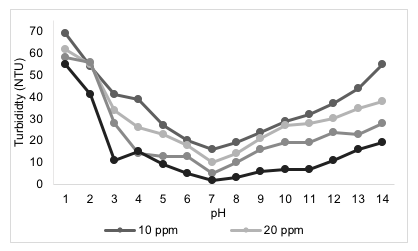The Effect of pH Variations and Aluminum Sulfate Coagulant Dosage on Reducing Turbidity in Salupangkang Tua River Water
Main Article Content
Abstract
This research was carried out using coagulation and flocculation methods. By using a varying pH series, namely 1 – 14 and also varying coagulant doses, namely 10 ppm, 20 ppm, 30 ppm and 40 ppm. The solution whose pH has been adjusted is then stirred using a flocculator with the addition of a coagulant for fast stirring at 100 rpm for 3 minutes, then a flocculant is added for slow stirring at 30 rpm for 3 minutes. After stirring, the turbidity of the solution was measured using a turbidimeter. The research show that pH and coagulant dosage parameters significantly influence the coagulation and flocculation process in water treatment at palm oil mills. The results indicated that the optimal pH for coagulation using aluminum sulfate (Al₂(SO₄)₃) is 7, with an effective coagulant dosage ranging from 30 ppm.
Downloads
Article Details
Section

This work is licensed under a Creative Commons Attribution-ShareAlike 4.0 International License.





